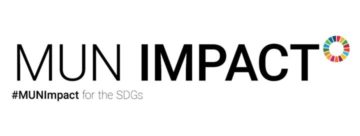BY MEENAKSHI MARIAPPAN, STAFF REPORTER
Born out of the depths of the COVID-19 pandemic, MUN@Home is one of MUN Impact’s flagship debate programs. Traditional Model UN debates or conferences usually have a problem of inaccessibility regarding the language and resources of topics discussed. More importantly, the heavy emphasis placed on the MUN simulation itself puts real action at the backseat, and delegates are not directly able to impact the issues discussed. Heidy Cho, Lead Mentor at MUN@Home, and Ray Cheng, Co-Secretary General of MUN@Home, break down the program for participants in this session.
What sets MUN@Home apart? MUN@Home is a free one month course for middle and high school students. Participants will receive online asynchronous coaching, get to debate SDG-related topics based on SDG targets with focus on real-time problem solving, and attend live online debates, gain exposure to SDG advocacy, and of course, acquaint themselves with the essence of Model UN, all in a positive working and learning environment! The program is open for individual students, with no experience needed, and is truly international, with programs available in various languages, and fully online. The program aims to encourage action in each part of the course. The program is structured so that delegates will be able to share about their favourite SDG in Week 1, and then gain knowledge about research reports, opening speeches, resolutions in the remaining three weeks. Each round culminates with a debate, which serves as a platform for discussion in a cooperative rather than competitive environment, and allows delegates to showcase their learning over the course of the round. As the program continues to grow, recent steps are being taken to make the curriculum more accessible, with recordings being released on YouTube to allow for asynchronous learning. Similarly, the leadership structure has also evolved to facilitate that growth, with a cohesion between the team better than ever to take the program to greater heights.
Of course, the program also has its fair share of fun involved. When asked about his favourite moments from his time at MUN@Home, Ray recalled his memory of a debate in April 2021, which he found “very incredible and fun” – as are all the MUN@Home debates! Heidy touched on her fond memories of past mentorship sessions, with their “tradition of creating very interesting, silly resolutions, so it’s easier to debate and allows delegates to improve their speaking skills whilst debating issues that are still lighthearted.” And they even debate topics like “pineapple on pizza”!
However, both Heidy and Ray agreed that what really inspires them about the program is “seeing people succeed, watching delegates return, seeing how their skill has improved,” and the way they “can make a change in someone’s life, even a small change” through MUN@Home.
Interested in joining MUN@Home, but still have questions? Our student leaders answered all burning queries from interested delegates and mentors alike during the session!
- How many times can you participate in the program? As many times as you’d like!
- Will delegates and mentors receive certificates after completing a round? Yes! Delegates and mentors will receive digital badges sent through email.
- What are mentorship sessions like? Delegates have the opportunity to attend weekly Zoom sessions with their mentors where they will be introduced to each of the following aspects of MUN, including research, position papers, opening speeches, and resolutions, alongside some fun activities!
- Does MUN@Home host speakers every month? Again yes! In addition to mentorship sessions, participants have the opportunity to hear from a range of inspiring guest speakers; past speakers include those from the UNHCR, other UN organizations, diplomats, youth leaders and more!
- How are delegates divided into cohorts? There are two programs for students of varying experience; the Intermediate delegate cohort is grouped together based on experience, whilst the rest are divided randomly.
- How can students become a mentor and how much experience is needed? Applications open before a round commences and can be found on our website or social media.Significant experience is not required; just a good grasp of MUN procedure and passion for mentoring and MUN!
- Do we get volunteer hours if we sign up as mentors? Yes! These can be used as CAS hours for IB, and even others like National Honour Society, for instance.
Interested in joining MUN@Home? Find us on our Instagram page, munathome, and head over to the MUN@Home webpage at https://munimpact.org/munathome/ for more information.
